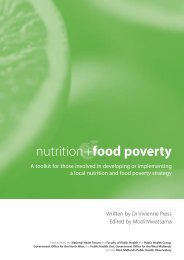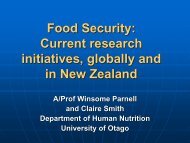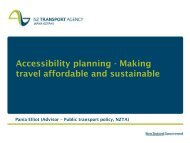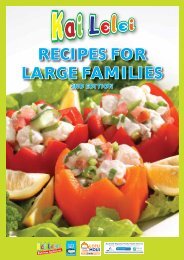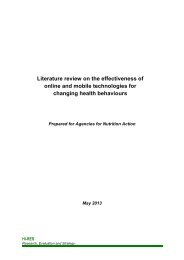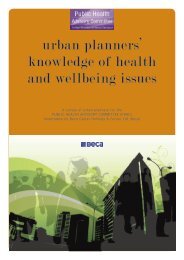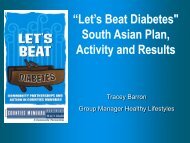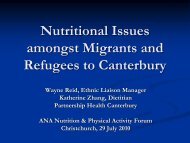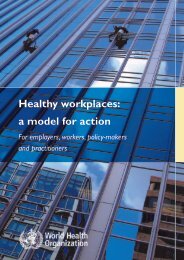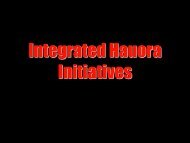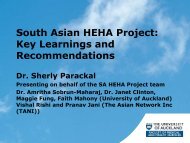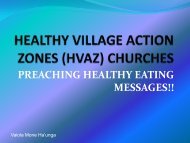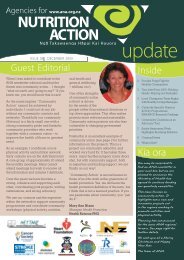enhancing food security and physical activity for maori, pacific and ...
enhancing food security and physical activity for maori, pacific and ...
enhancing food security and physical activity for maori, pacific and ...
- No tags were found...
You also want an ePaper? Increase the reach of your titles
YUMPU automatically turns print PDFs into web optimized ePapers that Google loves.
Enhancing Food Security <strong>and</strong> Physical Activity <strong>for</strong> Māori, Pacific <strong>and</strong> Low-income PeoplesThe need <strong>for</strong> ongoing support in the community has been highlighted by developers ofthe Pataka Kai train-the-trainer cooking skills course in Rotorua. 33 Structures need tobe in place to ensure trainers have support once their initial training is completed. Theoriginal course in Australia that Pataka Kai is based on is a community-based projectwith backing from social services, who provide ongoing support to trainers.Effect on equity <strong>and</strong> acceptability to stakeholdersCooking <strong>and</strong> lifestyle skills courses were identified as a popular option to enhance<strong>food</strong> <strong>security</strong> amongst attendees at the ENHANCE workshops in an earlier phase ofthis research. Participants represented a wide range of health-related organisations.Most favoured such interventions to be run through schools. Focus groups withMāori, Pacific <strong>and</strong> low-income groups identified a strong need <strong>and</strong> recommendation<strong>for</strong> community cooking classes, along with the desire to learn more about healthy <strong>food</strong><strong>and</strong> cooking. 3 Participants recognised a lack of knowledge <strong>and</strong> skills in areas such ashealthy <strong>food</strong> <strong>and</strong> how to prepare it, portion size, nutrition labels, cooking, nutrition <strong>and</strong>budgeting. Rural Māori identified that lack of cooking skills prevented them fromeating the <strong>food</strong> needed <strong>for</strong> a healthy life. Participants in the Māori focus groupssuggested cooking classes, demonstrations plus tastings, in<strong>for</strong>mation on how to shopproperly, <strong>and</strong> how to get a balance of meat <strong>and</strong> vegetables when making meals. Theyfavoured education on marae or in other Māori settings to encourage <strong>and</strong> supportMāori communities to eat healthily. Tongan <strong>and</strong> low-income focus groups suggestedfree community cooking classes, <strong>and</strong> all the Tongan participants agreed they wouldlike to attend such classes. Samoan <strong>and</strong> Māori groups wanted to learn more aboutnutrition <strong>and</strong> cooking. The Samoan group also thought that budgeting sessions run inthe community would be beneficial. There<strong>for</strong>e, a cooking skills intervention could beconsidered highly acceptable to those stakeholders consulted. Furthermore,evaluation of the Kai Lelei course showed it was well-liked, <strong>and</strong> was rated excellent bymany participants. Key in<strong>for</strong>mants in a a recent report <strong>for</strong> the Obesity Action Coalitionon <strong>food</strong> <strong>security</strong> <strong>for</strong> Pacific peoples in New Zeal<strong>and</strong> also identified a need <strong>for</strong> practicalcooking demonstrations or tasting sessions to address <strong>food</strong> <strong>security</strong> <strong>for</strong> Pacificpeoples. 34In the 1990s four community nutrition programmes <strong>for</strong> Māori were developed <strong>and</strong> runin different areas in New Zeal<strong>and</strong>. 35 They were based on a train-the-trainer concept,<strong>and</strong> aimed at developing basic <strong>food</strong> <strong>and</strong> nutrition skills in Māori community workers.The programmes included cooking skills <strong>and</strong> budgeting training. The programmestook a strong community-development approach <strong>and</strong> created a sense of ownership,empowerment <strong>and</strong> involvement. The programmes led to changes in the type of <strong>food</strong>available on marae, in Kōhanga Reo, Māori organisations, <strong>and</strong> in whānau; reducedconsumption of fat, sugar, <strong>and</strong> salt; <strong>and</strong> greater consumption of salads <strong>and</strong> water.Programmes such as these demonstrate the positive impact on equity <strong>and</strong>acceptability to stakeholders that community-based initiatives, such as cooking skillscourses, can have.Key components <strong>for</strong> effectivenessThe key components that would make such an intervention successful should bedetermined based on extensive consultation with the communities targeted 35 <strong>and</strong>findings from the international literature <strong>and</strong> ENHANCE focus groups. It should useappropriate methods to deliver in<strong>for</strong>mation <strong>for</strong> the target groups. 35 Evaluation ofcooking skills programmes will allow further identification of the key components <strong>for</strong>effectiveness, <strong>and</strong> should be an integral part of the programme plan. Robustevaluation of objectively measured cooking skills <strong>and</strong> <strong>food</strong> <strong>security</strong> outcomes areneeded.67



